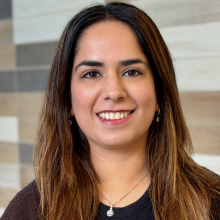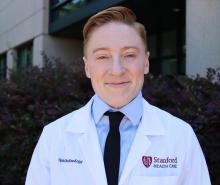People
Postdoctoral Fellows

Akanksha AkankshaAkanksha, Ph.D.
Akanksha joined the lab as a Postdoctoral Fellow in 2025 after earning her Ph.D. in Computational Biology from IIIT Delhi, India. She also worked as a visiting graduate researcher at UCLA during her Ph.D. Her doctoral research involved developing machine-learning-based tools to identify disease biomarkers in biofluids. Her current work focuses on using computational approaches for translational ophthalmic research.

Ahmad Al-Moujahed M.D., Ph.D., M.P.H.
Ahmad joined the lab in 2019. He graduated from Damascus Medical School, Syria. He then completed a research fellowship at Massachusetts Eye and Ear Institute, followed by a PhD in experiment pathology from Boston University School of Medicine. Ahmad also holds a master’s degree in public health from Northeastern University. Ahmad is working with data scientists in lab to identify molecular pathways in human retinal and inflammatory eye disease.

Madhumeeta Chadha Ph.D.
Madhumeeta joined the lab in 2024 after earning her Ph.D. in Cancer Biology from the Institute of Cancer Research, London. Her research focuses on multi-omics molecular profiling, leveraging proteomics and transcriptomics to identify and validate clinically relevant therapeutic biomarkers and targets, particularly in retinal diseases. She also applies advanced bioinformatics methodologies to support data-driven translational research.

Chase A. Ludwig M.D., M.S.
Chase joined the lab in 2018. He completed his undergraduate degree at Duke University and then his medical school training, a Master's in Epidemiology and ophthalmology residency, at Stanford University Medical School. He is interested in understanding the mechanisms of myopia and improving treatment and prevention of the resulting pathology. He worked with Dr. Mahajan as a resident and completed his surgical fellowship at Harvard's Massachusetts Eye and Ear Institute. Chase is a Vitreoretinal Surgeon and Assistant Professor in Ophthalmology at the Byers Eye Institute, at Stanford University and continues to work with Dr. Mahajan on the molecular genetics of myopia and biomarkers of vitreoretinal disease.

Gabriel Velez M.D., Ph.D.
Gabe joined the lab in 2016. He received his bachelor’s degree in molecular biology from Winona State University in 2014 and his M.D., Ph.D. from the University of Iowa in 2021. He is currently atttending an ophthalmology residency at Stanford University. Gabe is studying the structure of the calpain-5 (CAPN5) protein and its role in the development of Autosomal Dominant Neovascular Inflammatory Vitreoretinopathy (ADNIV), a rare blinding eye disease. His research interests include translational proteomics, structural biology, biophysical chemistry, enzymology, drug design, molecular modeling, and bioinformatics. He was awarded a NIH F30 grant in 2017.

Tsai-Chu Yeh M.D.
Tsai-Chu joined the lab in 2024 after completing her ophthalmology residency and vitreoretinal fellowship at Taipei Veterans General Hospital, Taiwan. She is currently an Assistant Professor at National Yang-Ming Chiao Tung University. Her research is centered on uncovering the mechanisms behind vitreous syneresis and synchysis, with the goal of advancing treatment and prevention strategies for retinal detachment.
